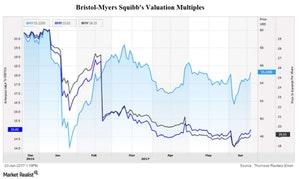Analyzing Bristol-Myers Squibb’s Valuation on June 20
As of June 20, 2017, Bristol-Myers Squibb was trading at a forward PE multiple of ~18.0x—compared to the industry average of 16.0x.
June 21 2017, Updated 9:08 a.m. ET

Bristol-Myers Squibb’s valuation
Bristol-Myers Squibb (BMY) is a pharmaceutical company that deals with innovative medicines for therapeutic areas including cardiovascular, immunoscience, oncology, neuroscience, and virology.
The two valuation multiples suitable for valuing companies with relatively stable earnings are the forward PE (price-to-earnings) and forward EV-to-EBITDA (enterprise value to earnings before interest, tax, depreciation, and amortization) multiples.
Forward PE
PE multiples represent what one share can buy for an equity investor. As of June 20, 2017, Bristol-Myers Squibb was trading at a forward PE multiple of ~18.0x—compared to the industry average of 16.0x. Other companies like Eli Lilly and Co. (LLY), Johnson & Johnson (JNJ), and Pfizer (PFE), are trading at forward PE multiples of 19.5x, 18.3x, and 12.4x, respectively.
Forward EV-to-EBITDA
On a capital structure neutral and excess cash-adjusted basis, Bristol-Myers Squibb currently trades at ~15.7x, which is much higher than the industry’s average of ~10.6x. Other competitors like Eli Lilly, Johnson & Johnson, and Pfizer have forward EV-to-EBITDA multiples of 14.4x, 12.5x, and 10.1x, respectively.
Analysts’ recommendations
According tohe data on June 20, 2017, Bristol-Myers’s stock value fell ~21.9% in the last 12 months. Analysts estimate that the stock price will rise ~3.5% in the next 12 months. Wall Street analysts’ recommendations show a 12-month target price of $57.14 per share—compared to the last price of $55.22 per share as of June 19, 2017. Out of 23 analysts covering Bristol-Myers Squibb, ten analysts recommend a “buy,” ten analysts recommend a “hold,” and three analysts recommend a “sell.” The consensus rating on Bristol-Myers Squibb stock is 2.43, which represents a moderate “buy” for value investors.
Investors can consider ETFs like the VanEck Vectors Pharmaceutical ETF (PPH), which holds ~4.4% of its total assets in Bristol-Myers Squibb, in order to divest the risk.
